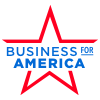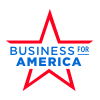Party Rifts & Voter Shifts: How Independents Are Changing American Politics
Roughly half of Americans see themselves as politically independent — yet in most elections they are forced into a binary decision between the two major parties. What are the implications of this growing disaffection with our political system? On September 25th, Business for America gathered experts to discuss how we got here, ways to increase competition for broader representation, and the potential impact of Independents in influencing the outcome of future elections.
“These rifts and shifts matter to the business community because of the importance of understanding the diverse viewpoints of your employees and your customers. Whether it be your employee voter engagement efforts, your policy advocacy, or your PAC spending, companies must consider how this political realignment impacts all levels of their business,” said BFA founder and CEO Sarah Bonk.
Didi Kuo, associate director for research at the Center on Democracy, Development, and the Rule of Law at Stanford University, shared her thoughts as to why so many voters are disillusioned with the current political parties. “There’s kind of a paradox today. We live in a time of really heightened polarization, in which the parties seem very strong. They’re really well financed. They’re excellent at winning elections and running campaigns. They also, however, seem weak. People are very upset at the party’s inability to select good candidates or to somehow manage political extremism and the extremist factions that have basically reworked the parties from the inside out. Many people don’t feel represented.”
John Opdycke, founder and president of Open Primaries, talked about how we can encourage greater participation by citizens who may be fed up with the more conventional set of choices they have. “We are suggesting that the primaries should not be a partisan function. They should be a public function of winnowing down issues and candidates from the first round to the second round as opposed to selecting a nominee for a party. This is a big shift that has had profound implications on voter satisfaction, voter participation, and legislative behavior.”
Opdycke continued, “Today we let the dogmatists… determine who the candidates are going to be in November, what issues are going to be talked about, and what issues become third rails. And that’s why the partisan primary system creates an electoral situation in which the most inflexible voices in America control everything, and that is profoundly destabilizing.”
Open primaries are just one of a number of political reforms that are being considered to address the mass disillusionment with the parties, but many obstacles remain. Though we are witnessing the rise of Independents within Congress who are championing moderation and bipartisanship, significant legal, financial, and institutional barriers for alternative parties and Independents. And then there is the question of whether Independents actually exist.
Jackie Salit, president of Independent Voting, suggested it is time to blow up the myth that independent voters are really party voters in disguise. “The whole ‘leaner issue’ is one of the most under-researched and mischaracterized phenomena in the entirety of political science. The research that we’ve done has shown that the myth of the independent voter is itself a myth… Independents cast ballots very situationally based on the paramount issues of the day, the candidates, and the offerings that are being put before voters.”
Salit continued, “If you look at the voting patterns over time, you see that Independents move back and forth in terms of political party allegiance. They also sometimes move in and out of Independent status, largely having to do with what rules govern primaries in their state… What it boils down to is that when an American identifies themselves as an Independent, they are making a statement of noncompliance with the political system.”
For businesses, large and small, diminishing faith in the two major parties may encourage new thinking about how to play a more positive role in our politics. And the rise of independent voters may cause businesses to recalibrate their political spending and advocacy. Salit offered, “You’ve got half the country saying they want something other than what those parties have to offer. And those people are not just voters. They’re consumers. They’re citizens. They’re part of the American public. A business leader who is attuned to these circumstances should be trying to figure out how to navigate all of that.”
GET INVOLVED
Business for America supports alternatives to give voters more choice, incentivize lawmakers to work together, and advance policies that lead to a more functional government that works for our people and economy. To learn more and get involved, visit bfa.us.

